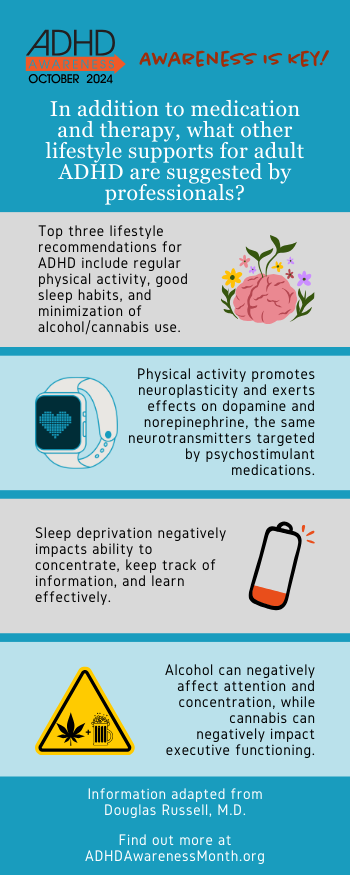Activities that are good for the brain and body tend to also be helpful in ADHD. My top three recommendations: regular physical activity, good sleep habits, and minimization of alcohol/cannabis use.

For people interested in supporting attention and improve executive functioning through lifestyle, fortunately science can provide guidance. My top three lifestyle recommendations for ADHD include
- regular physical activity,
- good sleep habits, and
- minimization of alcohol/cannabis use.
Vigorous physical activity exerts effects on the same neurotransmitters that psychostimulant medications target, increasing dopamine and norepinephrine in multiple areas of the brain including the prefrontal cortex and hippocampus. Physical activity also promotes neuroplasticity by enhancing the release of brain-derived neurotrophic factor (BDNF).
There is no one specific type of exercise that is especially good for ADHD. The best exercise for you is the one that brings joy and can be incorporated regularly into your schedule.
ADHD is associated with sleep problems including problems falling and staying asleep. Sleep deprivation negatively impacts your ability to concentrate, keep track of information, and learn effectively. So if you already have ADHD, poor sleep can make things worse.
Sleep hygiene is a set of behavioral, environmental modifications to improve sleep. These include maintaining a bedtime routine including consistent bedtime/rise time, limiting napping during the day, increasing daytime physical activity, reducing caffeine/alcohol/nicotine consumption, limiting screen-based activities close to bedtime, and restricting time in bed to sleep and sex.
Finally, we should talk about alcohol and cannabis. Alcohol lowers mood, increases inflammation in the body, and makes sleep worse. All three of these side effects can negatively affect attention and concentration. Cannabis is well known to negatively impact executive functioning. And with the sky-high THC content in modern products, dependence and unpleasant withdrawal symptoms are more common.
Put simply, habits which promote brain and body health also tend to help with ADHD. Incorporating these elements into your life will enhance any treatment plan for ADHD, and provide collateral benefits in terms of overall well-being. That is a win-win.
About the Author

Douglas Russell, MD, is a board certified adult and child/adolescent psychiatrist and an assistant professor at the University of Washington School of Medicine in Seattle.
